| Srl | Item |
| 1 |
ID:
172395
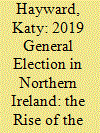

|
|
|
|
|
| Summary/Abstract |
The experience of the 2019 general election in Northern Ireland took a very different course to that of the rest of the UK and, indeed, to the pattern of electoral politics typical of the region. Coming after almost three years with no functioning devolved government, combined with intense disagreement and uncertainty about Brexit, voters were ready to give a message to the two largest parties. Both Sinn Féin and the DUP suffered losses in the election, with the headline outcome being that unionism no longer holds the majority of seats for Northern Ireland in Westminster. More generally, there was a swing from both sides towards centre ground voting, which brought significant gains for the Alliance Party and the SDLP. This article summarises the reasons for this broad trend, focussing on the conditions and electoral pacts which brought it about. It also considers what it might mean for the prospects for Irish unification, noting that a referendum on unification will only be passed by attracting votes from those who tend to see themselves as neither unionist or nationalist.
|
|
|
|
|
|
|
|
|
|
|
|
|
|
|
|
| 2 |
ID:
178027
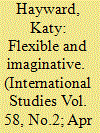

|
|
|
|
|
| Summary/Abstract |
The 1998 Good Friday (Belfast) Agreement that cemented the peace process formalized Northern Ireland’s position as a region integrally connected to both Great Britain and the Republic of Ireland. The multilevel governance and cross-border cooperation this entailed was enabled by common UK and Irish membership of the European Union. The UK’s decision to leave the EU posed risks to this settlement. In response, they engaged in a quest for ‘flexible and imaginative solutions’ to this conundrum. The unique arrangements established through the Protocol on Ireland/Northern Ireland in the UK–EU Withdrawal Agreement (2019) mark an innovative and ambitious development for the EU. First, it de facto includes a region of a non-member state within its internal market for goods and, second, it delegates the enforcement of its rules to that non-member state. The Protocol represents a significant departure for the EU in terms of its typical engagement with external actors. Most significantly, it will not only represent a ‘live’ concern for the EU but a unique type of responsibility.
|
|
|
|
|
|
|
|
|
|
|
|
|
|
|
|
| 3 |
ID:
134693
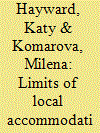

|
|
|
|
|
| Summary/Abstract |
This article examines the difficulties of finding local solutions to the problem of contentious events in contemporary Northern Ireland. In so doing, it offers a sociological perspective on fundamental divisions in Northern Ireland: between classes and between communities. It shows how its chosen case study—parades and associated protests in north Belfast—exemplifies the most fundamental problem that endures in post-Agreement Northern Ireland, namely that political authority is not derived from a common civic culture (as is the norm in Western liberal democracy) but rather that legitimacy is still founded on the basis of the culture of either one or the other community. Haugaard's reflections on authority and legitimacy are used to explore Northern Ireland's atypical experience of political conflict vis-à-vis the Western liberal democratic model. The Bourdieusian concepts of field illusio and doxa help to explain why it is that parading remains such an important political and symbolic touchstone in this society.
|
|
|
|
|
|
|
|
|
|
|
|
|
|
|
|
| 4 |
ID:
127654
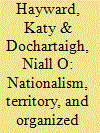

|
|
|
|
|
| Publication |
2013.
|
| Summary/Abstract |
Recent decades have seen significant advances in research on the relationship between nationalist ideology and organized violence. New scholarship has paid much closer attention to the microdynamics of violence, the strikingly uneven distribution of violence, the relationship between master cleavages and intimate local and personal struggles, and to process, history, and contingency. Nationalist ideology is understood to be bound up intimately with institutions and with everyday relationships at the local level. We introduce the contributions to this special issue, outlining the way in which they highlight the power of ideas, narratives, and microlevel solidarity in mobilization for violence and how they address the crucial importance of territoriality in linking ideas and action.
|
|
|
|
|
|
|
|
|
|
|
|
|
|
|
|
| 5 |
ID:
073574
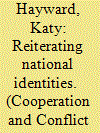

|
|
|
|
|
| Publication |
2006.
|
| Summary/Abstract |
The Haagerup Report commissioned by the European Parliament in 1984 was the first major initiative taken by the European Union (EU) on the situation of conflict in Northern Ireland. It embodied a conceptualization of the conflict as between two national identities defined in relation to the Irish border. The EU's self-ascribed role towards a settlement in Northern Ireland since that time has followed this vein by supporting the peaceful expression of British and Irish identities rather than reconstructing them or creating alternatives. This nation-based approach is encapsulated in the 1998 Good Friday Agreement between the governments of the UK and Ireland and political parties in Northern Ireland. Through detailed analysis of the Haagerup Report in the light of the peace process in Northern Ireland as a whole, this article assesses the implications of conceptualizing Northern Ireland as a clash of national identities for resolution of the conflict and argues for a subsequent reconsideration of the EU's role in conflict resolution.
|
|
|
|
|
|
|
|
|
|
|
|
|
|
|
|